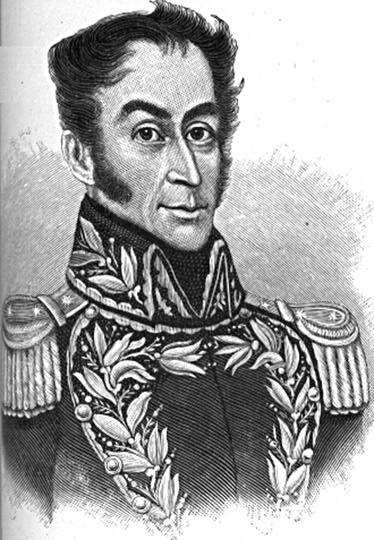 |
usa | world | animals | vocabulary | health | science | math | history |
Simon Bolivar
Simón José Antonio de la Santísima Trinidad Bolívar y Palacios (July 24, 1783 – December 17, 1830) was a South American revolutionary leader. Credited with leading the fight for independence in what are now the nations of Venezuela, Colombia, Ecuador, Peru, today's Panama and Bolivia, he is revered as a hero in those countries and throughout the rest of Latin America.
Bolívar was born in Caracas, New Granada (in modern-day Venezuela) into an aristocratic family, and was educated by different tutors after his parents died. Among his tutors was Simón Rodríguez, from whose ideas and educational style he received great influence.
Following the death of his parents, he went to Spain in 1799 to complete his education. In Spain he married María Teresa Rodríguez del Toro y Alaysa in 1802 but, on a brief return visit to Venezuela in 1803, she succumbed to yellow fever. Bolívar returned to Europe in 1804 and for a time was part of Napoleon's retinue.

Simon Bolivar
Bolívar returned to Venezuela in 1807 and, when Napoleon made Joseph King of Spain and its colonies in 1808, he participated in the resistance juntas in America. The Caracas junta declared its independence in 1810, and Bolívar was sent to England on a diplomatic mission. Bolívar returned to Venezuela in 1811. But in July 1812, junta leader Francisco de Miranda surrendered, and Bolívar had to flee to Cartagena de Indias. From there, Bolívar wrote his Cartagena Manifesto.
In 1813, after acquiring a military command in New Granada under the direction of the Congress of Tunja, he led the invasion of Venezuela. This was the beginning of the famous Campaña Admirable, the Admirable Campaign. He entered Merida on May 23 and was proclaimed El Libertador ("The Liberator"). Caracas was recaptured on August 6, 1813, and the second Venezuelan republic was proclaimed. After the fall of the second republic, he returned to New Granada, where he then commanded a Colombian nationalist force and entered Bogotá in 1814, retaking the city from the dissenting republican forces of Cundinamarca. He intented to march to Cartagena and enlist the aid of local forces in order to capture Royalist Santa Marta. However, after a number of political and military disputes with the government of Cartagena, Bolívar fled in 1815 to Jamaica, where he petitioned the Haitian leader Alexandre Pétion for aid.
In 1816, with Haitian help, Bolívar returned to the fight, landing in Venezuela and capturing Angostura (now Ciudad Bolívar). A victory at Boyacá in 1819 added Colombia to the territories free of Spanish control, and in September 7, 1821 Gran Colombia (a federation covering much of Venezuela, Colombia, Panama, and Ecuador) was created, with Bolívar as president and Francisco de Paula Santander as vice president.
Further victories at Carabobo in 1821 and Pichincha in 1822 consolidated his rule over Venezuela and Ecuador, respectively. After a meeting in Guayaquil on July 26 and 27 1822 with Argentine General José de San Martín, who had received the title of Protector of Peruvian Freedom in August 1821 after having partially liberated Peru from the Spanish, Bolívar took over the task of fully liberating Peru. The Peruvian congress named him dictator of Peru on February 10, 1824, which allowed Bolívar to completely reorganize the political and military administration. Bolívar, assisted by Antonio José de Sucre, decisively defeated the Spanish cavalry on August 6 1824 at Junín. Sucre destroyed the still numerically superior remnants of the Spanish forces at Ayacucho on December 9.
On August 6 1825, at the Congress of Upper Peru the Republic of Bolivia was created in honour of Bolívar, who drafted a new constitution for the new nation. But at home, Bolívar had great difficulties maintaining control of the vast Gran Colombia. During 1826, internal divisions had sparked dissent throughout the nation and regional uprisings erupted in Venezuela, thus the fragile South American coalition appeared to be on the verge of collapse. An amnesty was declared and an arrangement was reached with the Venezuelan rebels, but political dissent in New Granada grew as a consequence of this.
In an attempt to keep the republic together as a single entity, Bolívar called for a constitutional convention at Ocaña during April 1828. Bolivar had wanted to implement in Gran Colombia some or all of the elements of the Bolivian constitution he had written (which included a lifetime presidency with the ability to select a successor, though this was theoretically held in check by an intricate system of balances). This move was considered controversial and was one of the reasons why the deliberations met with strong opposition. Unhappy with what would be the ensuing result, Bolívar's delegates left the convention.
After the failure of the convention due to grave political differences, Bolívar proclaimed himself dictator on August 27, 1828 through the "Organic Decree of Dictatorship". He considered this as a temporary measure, as a means to reestablish his authority and save the republic, though it increased dissatisfaction and anger among his political opponents. An assassination attempt in September 1828 failed, as he emerged physically intact, but nevertheless greatly affected Bolívar.
Dissident feelings continued, and uprisings would later occur in New Granada, Venezuela and Ecuador during the next two years. Bolívar finally resigned his presidency on April 27, 1830, intending to leave the country for exile in Europe or the Caribbean, and died from tuberculosis on December 17, 1830, in "La Quinta de San Pedro Alejandrino", in Santa Marta, Colombia.
This article is licensed under the GNU Free Documentation License. It uses material from the Wikipedia article "Bolívar".